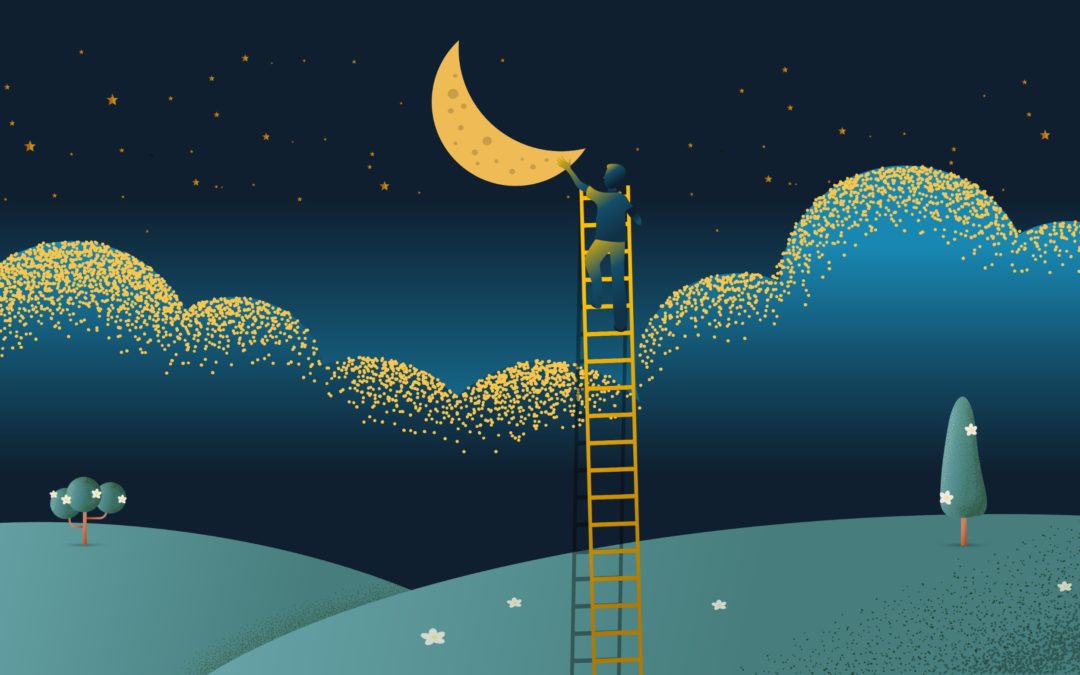Subtitle: A Post Full of Questions
🎵 “Just what makes that little old antThink he’ll move that rubber tree plant?Anyone knows an ant, can’tMove a rubber tree plant
But he’s got high hopes, he’s got high hopesHe’s got high apple pie, in the sky hopes… 🎶
For some reason, that song has been stuck in my head this past weekend. Raise your hand out there if you remember Laverne & Shirley singing it (I’m going to go out on a limb and guess it’s a little stretch for some of you to place those names). Whatever your recollection, it’s a fun sentiment, all happy and positive and stuff*. Don’t you just want to root for the brave, delusional insect and his unabashed optimism? You go, Ant!
I’m dating myself 😒.
But, what if…what if someone needs to bring that ant back down to reality? Like, yes, Ant old-buddy-old-pal, it’s nice to offer something a good shot, but sometimes you just have to acknowledge your limitations and give it a rest. What’s going on in his tiny brain**? What is he even going to do with the rubber tree once he’s moved it? I mean, he needs to come to grips with the ridiculousness of the situation.
Doesn’t he?
Or do you subscribe to the school of thought that if you reach for the moon, you might end up with some stars? Or…wait, is it the other way around?? The moon is closer than the stars, but poetically speaking stars are smaller – ack – I can’t ever keep it straight.
Never mind. The question is, when is something a beautiful stretch goal, and when is it a self-defeating, unrealistic boondoggle? It can be challenging to determine goal achievable-ness, and where we fall on the continuum from cheerful “Let’s go for it!” to pragmatic “You’re out of your league, honey.”
To take it one step further, what about setting the bar too low? How do we rightsize our expectations?
If, back in the hopeful first days of 2023, you set up some major projects for this coming year, what’s your take on them now? Do they line up with your capacity and abilities? If you’ve procrastinated, or completely let go of them, what do you think that’s about? I got to thinking about what some guidelines of order and organization might tell us about the matchup between our Selves, our dreams, and our expectations.
Let’s start with innate skills. Are they more or less in place, like someone great with words and stories aiming for that first novel? Or are they a little lacking, maybe even non-existent? As regular readers know I’m not athletic, but when I put my mind to that half-century bike ride a few years back, I had just enough baseline ability to follow through with it in a way that got me across the finish line. But if my goal had been to become a chemical engineer, I would have been SOL. I don’t possess those brain skills, I’ve never had even a glimmer of those brain skills, and they are not skills I can develop no matter how much I might work or study. I’m ok with that. Some ants can carry 5000 times their weight, so maybe Ant’s hopes are not so nuts after all (especially if he’s been hitting the gym regularly).
But next, are the innate skills to scale, i.e., in proportion? Let’s go back to me and the bike (sorry, it’s just a handy example). I did not plan to become a professional cyclist, go all out for the Olympics, or try to win any speed records. My skill level (paltry-to-so-so) was enough to get me through 60+ miles without freaking out or passing out, which is all I wanted to do. If we go back to our budding novelist, maybe they’re aiming to get it written and self-published, and see what happens. OR, perhaps they think they’ll make the NYT Bestseller list in the first month, sell the movie rights, and go live in Tuscany. Their talent for spinning a compelling tale is something for them to take into consideration with that expected final result.
Then there’s available time vs. energy spent. If you want to get all of your family photos digitized, organized, and categorized, how much effort would you need to put into the abilities required? What’s the benefit of developing those abilities vs. the time needed? If it takes you over an hour just to understand how to get one shot scanned, named, and placed in the correct folder so you can actually find it again, maybe it’s time to look for an expert to take over (yes, you can hire a professional photo organizer). Conversely, if you’re newly retired, looking at some wide open time, and totally into experiencing the process, spending the hours and energy might be worth it.
The stakes are something to ponder, too. There’s a distinction between a goal that makes life richer, easier, and more in alignment with your values, and a goal that connects to survival (keeping a job, managing an addiction, etc.). We don’t know the stakes for Mr. Ant – maybe that tree is the one thing keeping his family rubber band factory in business. Or, maybe it’s just a fantastical idea he got in his little head scrolling #antfarmtiktok. What are your stakes? Are you trying to get your spaces in order so you can age-in-place, feeling safe, comfortable, and functional in your home – or are you trying to emulate something you saw in a magazine or on social media? Either expectation is workable, but have pretty different ramifications. What are the consequences if you miss the mark on the “high hopes” goal?
So let’s go back to your why. Close to stakes, but a shade lighter. Say you want to organize your email accounts. You decide to pare down your email addresses from 11 to 3 (work, personal, and the one you give out to persistent store clerks), consolidate those remaining accounts, and get everything down to Inbox Zero. Why does this endeavor matter to you? Does it actually mean something to your success as a human, or is it something your buddy told you about that sounded cool? Does it have to be perfect, or could you be functional with Inbox Seventy-Eight? How do you want to feel at the end of your project?
Finally, there’s that bar-too-low situation. Like if our friend Ant decided to play it safe and stick to moving tiny scraps of leaves around the colony. Or if I had caved into my sometimes paralyzing fears and gone for the 33-mile bike ride option (or maybe just circled around my cul-de-sac) instead of the 62. Keep it super simple, and there’s no way to goof it up, right? No harm, no foul – and also no growth. What might you be missing out on if you don’t stretch? Being a little uncomfortable is good (I actually think being a LOT uncomfortable is good, but your mileage may vary).Where are your current goals aligned with your expectations, and what’s your next move?
*Did you know that “High Hopes” (written by Jimmy Van Heusen and Sammy Cahn) won the Oscar for Best Original Song at the 32nd Academy Awards in 1960? That would have been Sinatra, as opposed to Laverne OR Shirley.
**For those curious about ant brains, this article is fascinating.






I appreciate the weave of this story and where you end up aligning your current goals and expectations with action. The driving 2023 theme I chose this year is “What would it take?” Whenever I’m stuck, and even when I’m not, I have my question remind me to refocus and simplify. I can get in my head sometimes, preventing me from thinking and acting clearly. So coming back to the clarifying question, “What would it take?” helps me understand what I want to do next.
This has been especially helpful over the past few months with many moving parts, projects, and commitments. I’ve sometimes felt overwhelmed with all I said “yes” to and how those things ‘fell’ on the schedule. But again, coming back to my question has helped hugely.
Love that question, Linda, especially in the frame of taking on too much – and I can see it working forwards as well. If a new opportunity comes my way, asking “What would it take?” might save me a TON of time and stress. Thanks for stopping by!
Great post, Sara! When I work with clients, I find that finishing expectations tend to be short. After so many years of organizing projects, I find that expectations can be an issue for many people. They get discouraged and stop if they don’t see it completed in their timeframe.
I found that the expectation of a completed project should be defined by something other than what our head tells us it should be. There should always be leeway that will give us some flexibility to finish.
I also find that the earlier you start a goal, the more likely you will be able to finish at your deadline; this will factor in obstacles during the process. And, if there are no obstacles, the project usually finishes early.
Above all else, being kind to oneself through any new process is key.
Yes, self-compassion really does make a difference with how we approach our aspirations. No one knocks a stretch goal (or a rubber tree) out without some effort and discomfort – otherwise it would just be a regular old task. Thanks for your thoughts here, Sabrina!
You can date yourself, but you probably shouldn’t tell us if you vodio-doh-doh! 😉
And while the modern line about reaching for the moon and at least you land among the stars is good, the original from Now, Voyager has Bette Davis telling her lover, played by Paul Henreid, “Oh, Jerry, don’t let’s ask for the moon; we have the stars!” (It’s a fabulous “dame” movie, and wow, is it a great movie about changing your expectations!)
I love your tales, and this one, though not a fairy tale (an Ant Tale?) fits right in with those: wise, funny, and instructive. I tend to have low expectations, or at least not bold ones. If they’re someone else’s expectations, I can rise to them, but setting bold, audacious rubber-tree expectations for myself has never been my thing, though I often wish it were. Thanks for prompting me to think about this so much more deeply.
It’s been a long time since I’ve seen Now, Voyager. It must have been creeping around in the recesses of my old memories, and I have a new thing to put on my watch list – so thanks for that, Julie. I wish you bold, audacious, crazy high hopes goals, because I know super-smart you can figure out a way to reach them!
My mind immediately went to Laverne and Shirley. I loved that show. I think it still holds up, for anyone who hasn’t seen it.
Alignment of all these factors is the key question. I love how you looked at all aspects of our goals. Goals are actually multi-dimensional, yet we rarely see them that way. Instead, I feel pressured to reach high and go for it, regardless of the cost (physical, mental, emotional, financial). That’s a shame, because achieving a series of small goals may end up being more life-changing than reaching for, but not achieving, a more dramatic one.
Great seeing you at the Summit!!!
What a spot-on point about the smaller goals – yes, sometimes those little shifts and achievements add up to monumental results. As I read your comment I’m reminded of some smaller goals I’ve been working on myself, and noticing how impossible they feel sometimes (maybe I’m not giving them their proper credit). Thanks so much for the comment, Seana – it was great to spend a little time with you at the Summit!